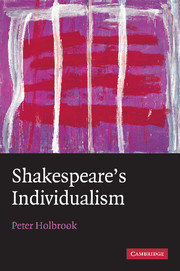Book contents
- Frontmatter
- Contents
- Acknowledgements
- Introduction
- PART I SHAKESPEARE, HAMLET, SELFHOOD
- PART II SHAKESPEARE AND EVIL
- 9 ‘Old lad, I am thine own’: authenticity and Titus Andronicus
- 10 Evil and self-creation
- 11 Libertarian Shakespeare: Mill, Bradley
- 12 Shakespearean immoral individualism: Gide
- 13 Strange Shakespeare: Symons and others
- 14 Eliot's rejection of Shakespeare
- 15 Shakespearean immoralism: Antony and Cleopatra
- 16 Making oneself known: Montaigne and the Sonnets
- PART III SHAKESPEARE AND SELF-GOVERNMENT
- Conclusion: Shakespeare's ‘beauteous freedom’
- Index
- References
15 - Shakespearean immoralism: Antony and Cleopatra
Published online by Cambridge University Press: 06 July 2010
- Frontmatter
- Contents
- Acknowledgements
- Introduction
- PART I SHAKESPEARE, HAMLET, SELFHOOD
- PART II SHAKESPEARE AND EVIL
- 9 ‘Old lad, I am thine own’: authenticity and Titus Andronicus
- 10 Evil and self-creation
- 11 Libertarian Shakespeare: Mill, Bradley
- 12 Shakespearean immoral individualism: Gide
- 13 Strange Shakespeare: Symons and others
- 14 Eliot's rejection of Shakespeare
- 15 Shakespearean immoralism: Antony and Cleopatra
- 16 Making oneself known: Montaigne and the Sonnets
- PART III SHAKESPEARE AND SELF-GOVERNMENT
- Conclusion: Shakespeare's ‘beauteous freedom’
- Index
- References
Summary
The excellence of every Art is its intensity.
Letters of John Keats, ed. Gittings, 43.O for a Life of Sensations rather than of Thoughts!
Ibid., 37.We could summarize Eliot's objection to Shakespeare by saying that he finds Shakespeare to be a bad influence – morally problematic. The anarchic energies that drive Shakespearean writing end in Nietzscheanism. Whatever the simplifications involved in putting Eliot's case this way, it at least helps us see how his position is connected to Johnson's and Hazlitt's judgements (noted earlier) that Shakespeare is not a moral author. And we have seen how other readers and critics (Gide and A. C. Bradley among them) have taken a similar view of Shakespeare, as presenting a challenge to morality repressively conceived. Such judgements need not stop us believing that Shakespeare is an ‘ethical’ author, of course, but we may need to be clearer about what we mean by that word (and, like Bradley, may want to expand our notion of ‘good’). For instance, we may need to recognize that fidelity to self-realization can be a good – that care for the self can be an ethical command.
One way Shakespeare may present a problem to moral thought is that, like Nietzsche, he seems on occasion interested in exploring those situations in life in which vice becomes virtue, or virtue vice.
- Type
- Chapter
- Information
- Shakespeare's Individualism , pp. 172 - 182Publisher: Cambridge University PressPrint publication year: 2010



